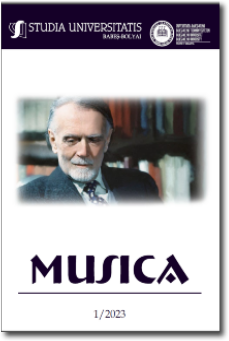THE ROLE OF ZOLTÁN KODÁLY’S MALE CHORUSES IN THE GENRE’S HISTORY, POSSIBILITIES OF THEIR APPLICATION IN THE REPERTOIRE OF AMATEUR ENSEMBLES
THE ROLE OF ZOLTÁN KODÁLY’S MALE CHORUSES IN THE GENRE’S HISTORY, POSSIBILITIES OF THEIR APPLICATION IN THE REPERTOIRE OF AMATEUR ENSEMBLES
Author(s): Mónika VéghSubject(s): Music, Hungarian Literature, 19th Century, History of Art
Published by: Studia Universitatis Babes-Bolyai
Keywords: Zoltán Kodály; male voice choir; Liedertafel-movement; choral societies; Hungarian poetry of the 19th century;
Summary/Abstract: Zoltán Kodály’s publication titled Férfikarok (Male Choruses) is a truly diverse collection: in addition to the composer’s works in the genre, one can find folk song arrangements, religious pieces, compositions inspired by historical events and even transcriptions, of various lengths and levels of difficulty. It is common knowledge that Kodály was not fond of exclusively male ensembles, being rather uninterested by male voice choirs and indeed his opinion was that these choral societies should be converted into mixed choirs. However, after travelling extensively in the country – thus gaining insight into the operation of these groups – he began to contribute to the genre’s repertoire. The composer began to view the case differently, as he thought that amateur male choirs – of which there were still many in the 1930s – should rather sing compositions of a higher value, as opposed to pieces of the Liedertafel-style. At the same time, the Férfikarok collection contains many pieces that are not suitable for amateur ensembles due to their challenging nature in terms of intonation and tone production. In this paper – in addition to presenting the volume – I intend to introduce a certain way of categorization based on the compositions’ level of difficulty, through an analytical approach, which may be of help to those who work with such ensembles that are rare, but worthy of appreciation.
Journal: Studia Universitatis Babes-Bolyai - Musica
- Issue Year: 68/2023
- Issue No: 1
- Page Range: 203-219
- Page Count: 17
- Language: English

